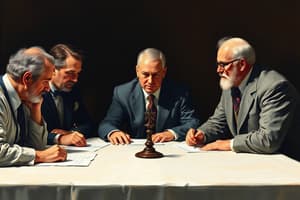Podcast
Questions and Answers
What is the primary function of the corporate veil in relation to shareholder liability?
What is the primary function of the corporate veil in relation to shareholder liability?
Under what circumstance may a court decide to pierce the corporate veil?
Under what circumstance may a court decide to pierce the corporate veil?
Which of the following best describes the concept of limited liability in incorporated businesses?
Which of the following best describes the concept of limited liability in incorporated businesses?
What is a potential downside to the corporate veil for creditors?
What is a potential downside to the corporate veil for creditors?
Signup and view all the answers
In which situation is piercing the corporate veil more likely to be upheld in court?
In which situation is piercing the corporate veil more likely to be upheld in court?
Signup and view all the answers
Which of the following factors may vary significantly between countries regarding the piercing of the corporate veil?
Which of the following factors may vary significantly between countries regarding the piercing of the corporate veil?
Signup and view all the answers
What does the term 'piercing the corporate veil' imply?
What does the term 'piercing the corporate veil' imply?
Signup and view all the answers
What is one of the key purposes behind the structure of limited liability companies?
What is one of the key purposes behind the structure of limited liability companies?
Signup and view all the answers
Which action is NOT considered a tactic for avoiding personal liability as a director or shareholder?
Which action is NOT considered a tactic for avoiding personal liability as a director or shareholder?
Signup and view all the answers
Which of the following is a characteristic of the corporate veil?
Which of the following is a characteristic of the corporate veil?
Signup and view all the answers
Study Notes
Directors and Authority
- Directors act as agents of the company, their actions are attributable to the company.
- Authority granted to directors comes from the company’s constitution/by-laws or shareholder votes.
- The company is liable for directors' actions, provided they stay within their granted authority.
Liability of Directors
- Directors are not personally liable for actions within the scope of their authority.
- Shareholder ratification of a director's actions provides immunity even if such actions exceed their authority.
- Directors risk personal liability for transactions beyond their granted authority.
Director’s Duties
- Directors are fiduciaries, primarily serving the interests of the company, not shareholders.
- They must act with care, loyalty, good faith, and in the best interests of the company.
- Obligated to disclose potential breaches of duty or conflicts of interest.
- Must maintain confidentiality regarding company information.
Company Management Structure
- Companies are managed by directors, typically as a board.
- Structures can vary by country; for example:
- Germany: Two-tier system with supervisory and management boards.
- France: Options for either a board of directors or an executive board with shareholders’ council.
- China: Dominance of shareholder decision-making.
Appointment and Responsibilities of Directors
- Directors are appointed and can be removed by shareholder votes.
- They make collective decisions as a board and manage daily company operations.
- Directors must follow national laws and the company’s constitutional rules.
Corporate Veil and Shareholder Liability
- Limited liability separates company owners from business liabilities.
- The ‘corporate veil’ protects shareholders from claims against the company.
- Protection from liability has limitations and is not absolute.
Piercing the Corporate Veil
- Courts may allow the corporate veil to be pierced, permitting action against individuals responsible for decisions leading to harm.
- Conditions for piercing the veil differ by jurisdiction.
- Aims to prevent misuse of corporate status to escape liability for unethical behavior or fraud.
Studying That Suits You
Use AI to generate personalized quizzes and flashcards to suit your learning preferences.
Related Documents
Description
This quiz explores the role of directors in corporate governance, focusing on their authority and obligations when acting on behalf of the company. It covers how directors' actions are attributed to the company and the implications of their decisions for the organization. Test your knowledge on the essential legal frameworks that define these relationships.




